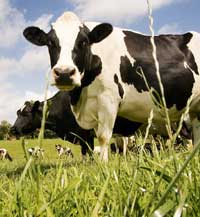Farmers still coming to terms with DFoB collapse

Farmers who supplied milk to Dairy Farmers of Britain are still struggling to come to terms with the co-op’s collapse, nearly a year after the business closed.
Speaking as MPs released a report outlining the reasons behind the co-op’s failure, producers across the country have described how they have dealt with losing thousands of pounds in lost milk cheques and shares.
Northumberland milk producer Anthony Crozier said he had just about “scraped through” following the collapse of DFoB – but it had cost him at least £28,000 and put another £3500 on his income tax bill.
“We lost £10,000 worth of milk income and another £18,000 we’d invested as DFoB producers.
“But because the DFoB shares had been converted into equity shares our tax bill had another £3500 added to it because we could only offset the investment by showing capital gain – in other words we had to sell something to cover it and that wasn’t an option,” said Mr Crozier who milks 70 cows near Stocksfield.
An increase in the farm’s overdraft was needed to cover the financial loss.
“We needed to do that stay afloat and we’re still paying for the increased overdraft facility.”
A new buyer was found and the farm now supplies Manchester Dairies on a direct supply contract which is an improvement on the fluctuating prices being paid under the DFoB contract.
Andrew Potter, whose family farm milks 90 cows at Farndale, North Yorkshire, said his business was still viable, but it had been “a struggle” to come through the financial trauma of the DFoB collapse.
Admitting to a loss of “over £30, 0000”, he faced weeks of frustration trying to find a new milk buyer.
“We were rejected several times – either we weren’t big enough in terms of how much we were producing or the companies were approached said they were over-supplied.
“It was very difficult at the time and we were getting just 16p a litre for the milk. In total we lost the equivalent of two months’ milk income.”
The Potters were eventually successful and found a buyer in Chestnut Dairies – a local firm that made a decision to commit itself to locally produced milk.
Judith and Stephen Foreman of Skipton, East Yorkshire, had £15,000 in shares in the co-op, but have heard nothing about their investment since the business collapsed in June.
They wrote-off the sum but are now concerned they will face an increased income tax bill of several thousand pounds because the shares had been converted to equity shares.
“It’s scary because that money’s just gone,” said Judith. “The increased tax bill is a big worry, especially given the state of the industry at the moment.
“Someone warned us years ago that family farms would be replaced by a few huge herds. We couldn’t believe it but things like this are making it come true.”
